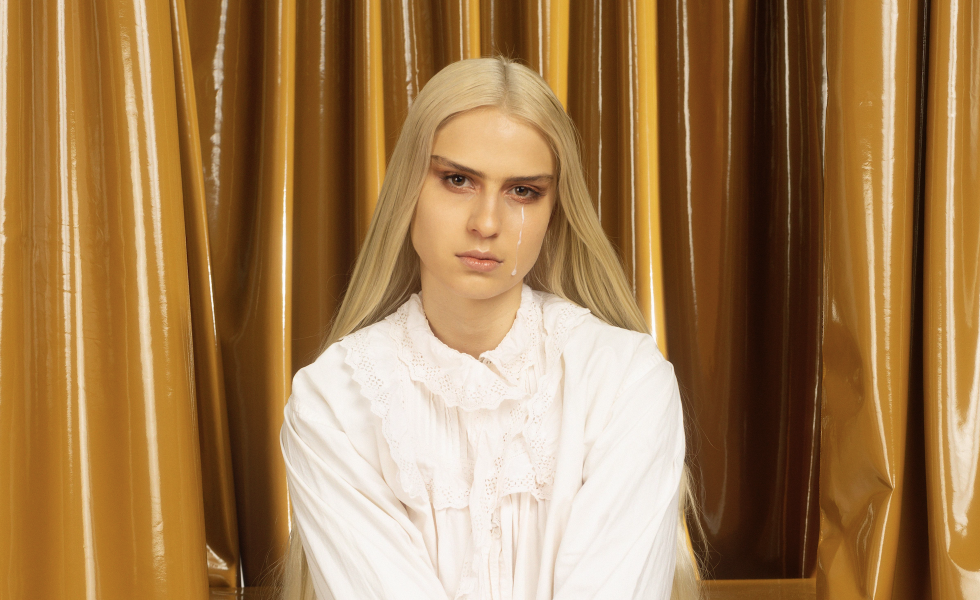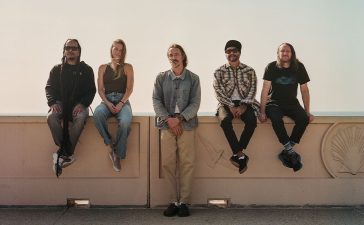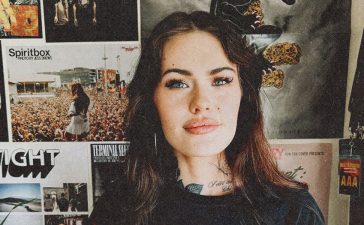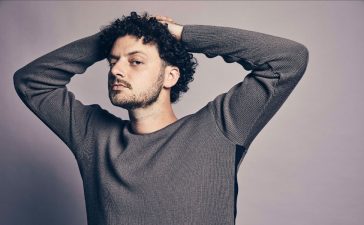The concept of a ‘hyperpop ballad’ feels like an oxymoron in the making, but with her brutally emotive second full-length, Tear Tracks, Banoffee has made a whole album of them… And a fucking great one, at that.
The Melbourne-based artist – who started out as part of Charli XCX’s entourage, then linked up with the likes of SOPHIE and CupcakKe on last year’s Look At Us Now Dad – describes Tear Tracks as “a linear record of a deep suffering during lockdown in Australia”. It was written in the midst of personal turmoil, navigating death, a breakup and a global pandemic, all while she fought earnestly to make a name for herself. The new record became a lifeline for Banoffee (real name Martha Brown) – an outlet for her raw, honest musings set to punchy, glitched-out pop beats.
As she tells BLUNT, Tear Tracks is a bit of a catch-22: it marks a defiant new era for an artist now freed of the music industry’s shackles (she ditched her former label to release the album how she wanted to, in exactly the state she wanted it to exist in), and paved the way for a wealth of personal growth and creative development – but it couldn’t exist without very real, debilitating trauma. It’s a product of anguish in every sense, and that raw, visceral emotion seeps into the record’s every nook and cranny. But as she stands on the other side of it, head held high and staring down at a bright future, Brown couldn’t be more proud of Tear Tracks.
Especially after how chaotic the past 18 months have been, how does it feel now that you’re finally on the other side of it all?
It’s nice to have something to be able to bookend it with, y’know? To be like, “Okay, that’s finished.” I think as everyone knows, all the uncertainty and the amount of variables in life at the moment, it’s all just so impossible to wrap your head around. I find it really challenging – I’m the person who really needs to have certainty and routine in their life, so having a record like this be finished is really comforting in that way. But it’s also absolutely terrifying, because [Tear Tracks is] a record that I haven’t really done in a very traditional way. I don’t have a label for this record, and I’m very much releasing it as it’s written – some of the songs are still being finished, and the album is out in a month.
What made you want to go independent for this one?
Basically that – I wanted to release it as I was writing it, and that’s not really something record labels are into doing. Musically, too, it’s not an album that someone would advise you to release. It’s mostly ballads – it’s a sadgirl record, there’s no club track on it – and I know that at the moment, the songs that do well are ones that hit in the club. But I’m here like, “Nah, I’m gonna write a sad album. I’m gonna write a record that people can just cry to at home.” For me, during the pandemic, I had to become okay with being alone and knowing that no one’s going to do the work for me. And going independent for this record was a part of that journey, just being like, “I’m going to do this my way, and do it for different reasons than to be a commercial success or to make money for a record label.” It’s more about the catharsis that comes with releasing something really honest and something that still going through, instead of something I have to release and talk about in retrospect.
The press release for this album said you’d written and recorded it right in the wake of a breakup. Did you find that it was easier to write about everything you did while the wounds were still fresh, and everything was still very relevant to what was going on in your life?
Yeah! I very much use music as therapy, so whenever I’m going through a hard time, that’s when I write the most. The record came really easily in that way – it’s just like it fell out of me, and there was. I think the hard bit with this record was working out how to release it in a way that felt safe for me, in a way that felt like I could keep some secrets and keep some things mine, whilst also wanting to do something completely honest and something that felt very revealing. So those sorts of boundaries were very challenging to work out.
“Second records are terrifying altogether, because suddenly people know who you are, and they have expectations.”
With all the growth that you’ve had as an artist since Look At Us Now Dad came out last February – both in terms of creative evolution and your rise in popularity – is it daunting to have something so much more soul-baring and honest come out to what is effectively a crowd of millions at this point?
It’s terrifying for many reasons. Second records are terrifying altogether, because suddenly people know who you are, and they have expectations. It’s like with Kacey Musgraves’ new record – everyone keeps asking me if I’ve listened to it yet, and I haven’t, because I’m terrified. I loved the last record so much, and I want to love this one so much that I’m scared to listen in case I don’t. And I know I will, but like, I know that feeling so well about second records.
I think that’s part of the reason why I didn’t follow the normal route of releasing an album, because I was like, “That’s too much pressure. I can’t release a second album right now – I just released my first one, a pandemic has hit, and I don’t have any dance tracks in me because I’m completely miserable and bored.” I was like, “I just have to release something that feels right.” I guess the only way to navigate whether [Tear Tracks was] going to be a failure or not was to be like, “Let’s redefine what a failure is.” For me, a failure would have been not releasing the album now, or releasing something that was trying to be Look At Us Now Dad.
There are going to be people who really loved dancing to ‘Ripe’ or ‘Fuckwit’ who are going to hear this album and be like, “What is this!? These aren’t the hyperpop jams I wanted to come out!” And I’ll be like, “Well, sorry!” All of that pressure built up and just led to me working out a way that felt right. And what felt right was making something completely different.
There’s a feeling of rebellion in that, too, isn’t there? You’ve built up this profile with these big hyperpop club tracks, and now you’re like “Okay, here’s my emo album.” That’s ballsy shit.
Yeah! A lot of people [who I showed Tear Tracks to] were like, “There needs to be a single here, or, like, a dance track.” And I’m like, “There are singles!” There are definitely singles on this album, they’re just not what you think they would be. And a lot of that was hard – y’know, a big inspiration and collaborator on my last record was SOPHIE, and losing her while I was writing this record made me [realise that] I had to make a shift. I couldn’t rely on the muses as I had for the last record, and I couldn’t… I had to make some changes, because the world was changing, and I had to change with it.
So do you see this record as indicative of where you’re heading as an artist? Or is Tear Tracks just an outlier in the Banoffee Cinematic Universe?
It’s definitely a moment in time. I’ve already begun writing the next record, and there are already so many club tracks on there. Yeah, Tear Tracks is definitely a moment in time. But it was a very important moment in time for me to see through to the end, I think.
That presser also pointed out that you’d made Tear Tracks during your last few months in LA. Do you find that, as a songwriter, the environment you’re in has an influence on your creativity?
Yeah, I think wherever I am in the world, and my surroundings, change everything so much. I think part of the reason there are a lot of more heartfelt and folk-influenced songs on this record is that when I left Los Angeles, I had to quarantine, and I was quarantining in a little cabin by the ocean. And y’know, that’s a really calm place to be – it’s a good place to be reflective in. Yeah, my environment – and people I’m around – definitely have a huge influence on the type of music I’m making.
“I definitely feel like I’m sitting above it all now, just watching this record, and that feels really good.“
What led you from the bustling chaos of LA to a cozy little cabin on the oceanside?
Purely running away from the pandemic. I normally live in LA and come home for Christmas every year. I’d just been home for Christmas, and I flew back, having heard rumours of this, y’know, “Coronavirus”. People were just starting to wear masks, and I was like, “What is this thing? This is gonna blow over! It’s just another one of those things that will blow over.” I was in LA for 10 days, and then I realised that we were screwed. I was locked down in LA for most of that – and y’know, being an Australian, I had no access to any of the government help.
All my shows were suddenly cancelled, everybody was freaking out – and you remember the beginning of the pandemic, people were petrified. My sisters were calling me, being like, “Something’s gonna happen to mum and dad and you won’t be here, and you’ll never forgive yourself!” They were giving me the real sort of guilt trip about coming home. So I just left all of my belongings in Los Angeles – I came back with one carry-on suitcase, thinking I’d be home for a couple of months, and that was it. And then suddenly I was in a cabin, watching the world fall apart on the news and just being like, “Oh shit, I’m going to be here for a while…” And then yeah, everything happened as it did.
Life started to sort of unravel for a little while. I watched my first album get buried in all the COVID news, and that obviously had effect on my relationship at the time, and my mental health – all of that. COVID really just took hold, and that meant a lot of things in my life at that time came to an end… And that’s where Tear Tracks came from.
So where are you at now, as far as your thoughts about the future go?
I feel really optimistic! I feel like Tear Tracks was just this purge for me. I needed to stop compartmentalising a lot of pain, and really face it and work through it. And as messy and bloody and excruciating as that is, with that comes hindsight and growth. You realise that nothing can last forever. And I definitely feel like I’m sitting above it all now, just watching this record, and that feels really good.
I think ‘Tears’, the last song, explains that quite well. There’s just this sort of stillness that I came to after this, like, thrashing. I literally just felt like a fish out of water, thrashing and fighting everything, and trying to fix everything, and I was just so miserable in the despair of everything. There was a lot of loss that a lot of us experienced, and then I just came to a place of stillness. And I’m really happy in that. I’m really looking forward to releasing this album, then going back overseas and writing another one. I’m excited to be doing my career my way – which I never would have come to if COVID never happened.
>> KEEP READING: Inside the “scary, ethereal and kind of cursed” philosophy of daine <<
Tear Tracks is out now independently
Click here to get around it










